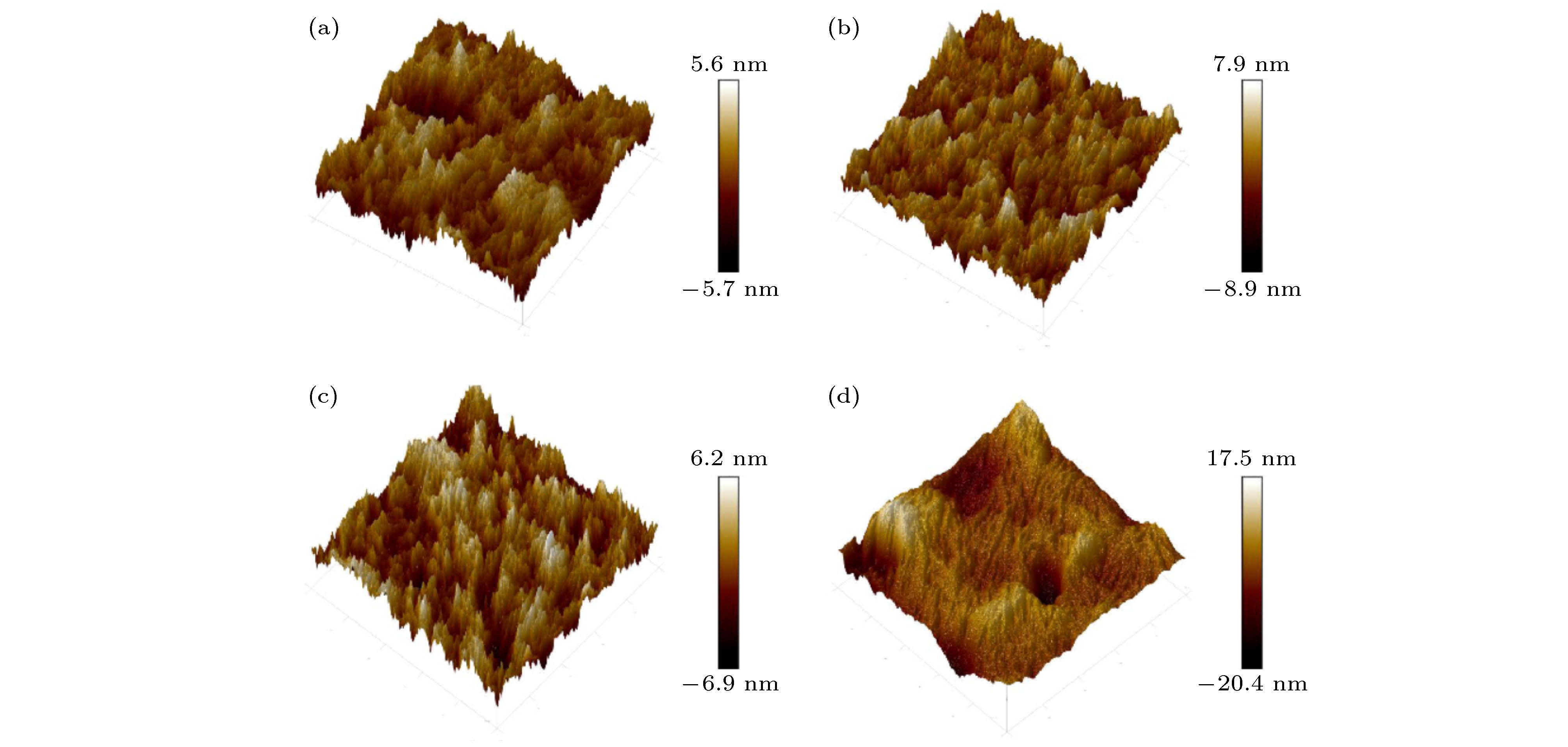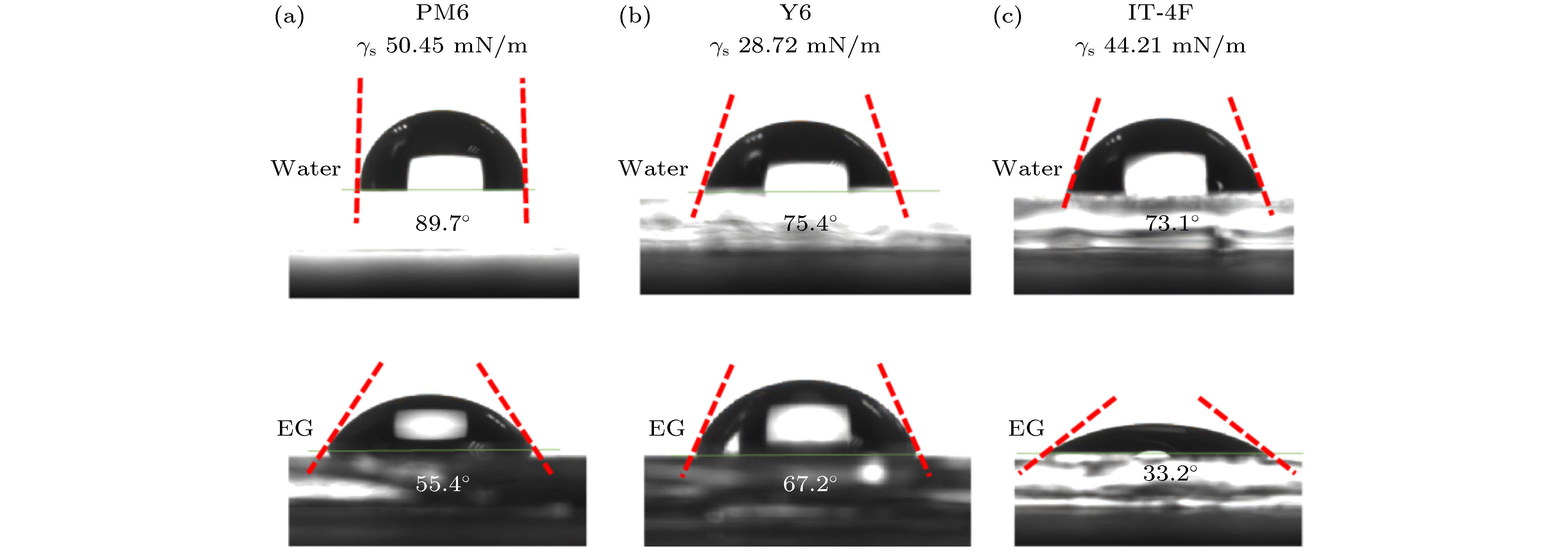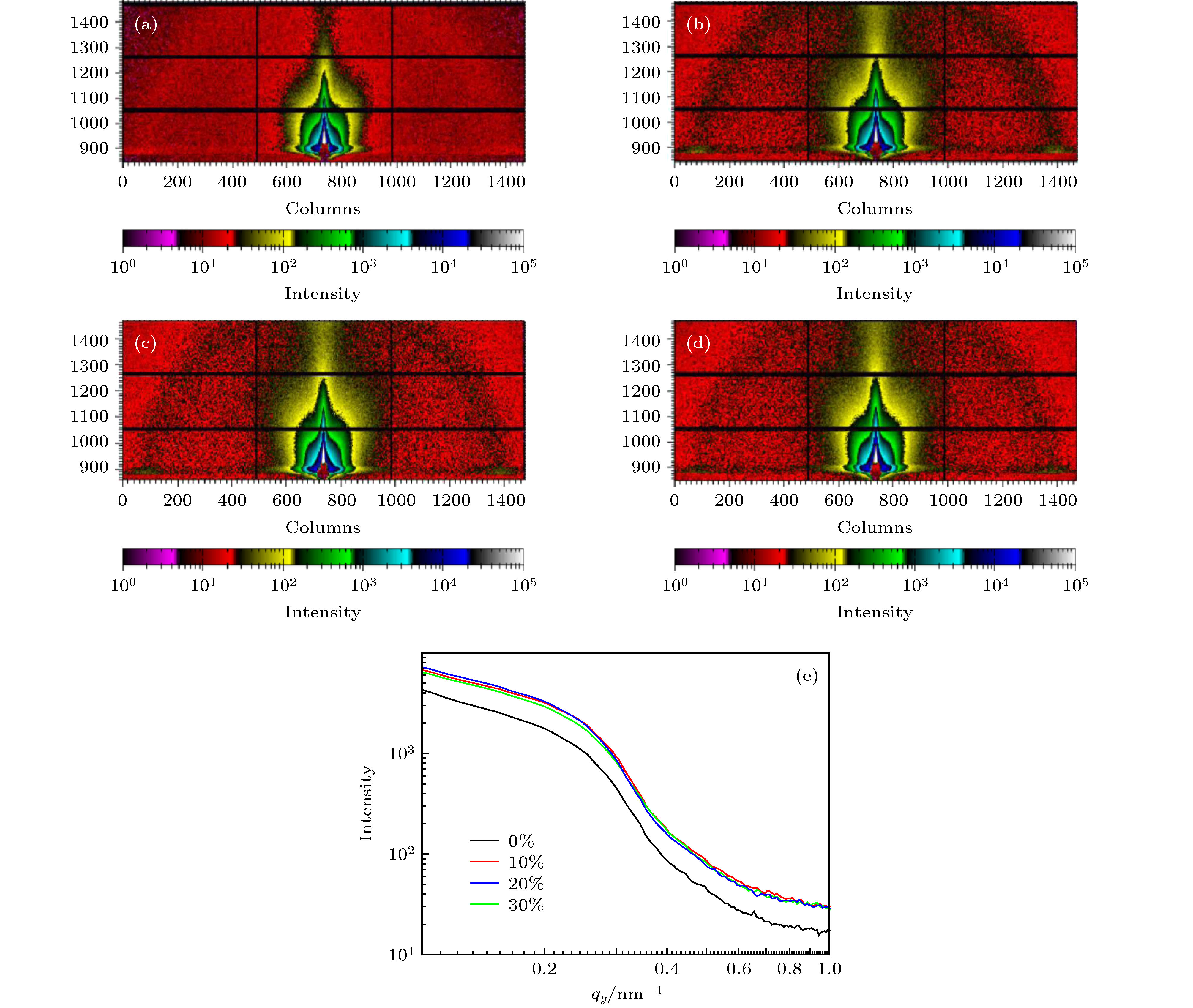-
Organic photovoltaics (OPVs) have been considered as one of the preliminary candidates for the third-generation solar cells due to their particularly advantages, such as light-weight, low cost, solution processability and mechanical flexibility. In recent years, the power conversion efficiency (PCE) of OPVs has achieved remarkable progress with the development of non-fullerene acceptors (NFAs), which exhibit stronger capability of light absorption and stability than the fullerene acceptors. However, the narrow absorption properties of organic materials still restrict the further breakthrough of the performance of OPVs. It is difficult for the binary heterojunction films to realize the effective wide spectrum utilization of solar energy. Ternary strategy, which consists of one donor and two acceptors or two donors and one acceptor in a bulk-heterojunction, has proven to be an effective and facile way to enhance performances of OPVs. The emergence of new NFAs such as ITIC, IT-4F, Y6 etc. greatly increases the selectivity of acceptors in a ternary system. It is necessary to investigate the compatibility of latest NFA materials and corresponding ternary device performance. In this article, we report a new ternary OPV system with dual NFAs and a polymer donor. The excellent NFA material (Y6), which was first reported in 2019, is used as the third component. Different concentrations of Y6 are introduced into the binary system based on PBDB-T-2F:IT-4F. The compatibility between materials and device performances are investigated through absorption capability of blend films, AFM, water contact angle, GISAXS, and corresponding electrical properties of devices. The 12.48% PCE is achieved from ternary OPVs with PBDB-T:IT-4F as the active layers containing 20wt% Y6 in acceptors, resulting from the enhanced Jsc of 22.09 mA/cm2, Voc of 0.83 V and FF of 68.45%. The origin of the improvement of the ternary OPVs is summarized below. Firstly, an apparently complementary absorption spectrum is obtained through the introduction of Y6, which has a stronger photo harvesting capability in the spectral range from 750 to 950 nm than IT-4F, and higher short current density (Jsc) is observed in the ternary devices than in the binary device. Secondly, a rougher surface of the active layer is observed by increasing the Y6 concentration, which may result in an inferior exciton dissociation and charge transport process, the existence of larger-scaled crystal is proved by the GISAXS technology. Thirdly, the introduced Y6 can help to suppress the bimolecular recombination, which is in favor of the incremental device performance. Approximately 17.85% PCE improvement is obtained in comparison with PBDB-T-2F:IT-4F based binary OPVs. -
Keywords:
- organic photovoltaics /
- ternary OPVs /
- non-fullerene accepter /
- high efficiency
[1] Xie J, Wang X, Wang S, Ling Z, Lian H, Liu N, Liao Y, Yang X, Qu W, Peng Y, Lan W, Wei B 2019 Org. Electron. 75 105381
 Google Scholar
Google Scholar
[2] Sekine C, Tsubata Y, Yamada T, Kitano M, Doi S 2014 Sci. Tech. adv. Mat. 15 1468
 Google Scholar
Google Scholar
[3] Xu X P, Zhang G J, Li Y, Peng Q 2019 Chin. Chem. Lett. 30 809
 Google Scholar
Google Scholar
[4] 黄林泉, 周玲玉, 于为, 杨栋, 张坚, 李灿 2015 64 26
 Google Scholar
Google Scholar
Huang L Q, Zhou L Y, Yu W, Yang D, Zhang J, Li C 2015 Acta Phys. Sin. 64 26
 Google Scholar
Google Scholar
[5] Garcia A, Welch G C, Ratcliff E L, Ginley D S, Bazan G C, Olson D C 2012 Adv. Mater. 24 5368
 Google Scholar
Google Scholar
[6] Carle J E, Krebs F C 2013 Sol. Energy Mater. Sol. Cells 119 309
 Google Scholar
Google Scholar
[7] Fu H T, Wang Z H, Sun Y M 2019 Angew. Chem. Int. EDIT 58 4442
 Google Scholar
Google Scholar
[8] Zhao W, Qian D, Zhang S, Li S, Inganas O, Gao F, Hou J 2016 Adv. Mater. 28 4734
 Google Scholar
Google Scholar
[9] Liang Q, Han J, Song C, Yu X, Smilgies D-M, Zhao K, Liu J, Han Y 2018 J. Mater. Chem. A 6 15610
 Google Scholar
Google Scholar
[10] Fan Q P, Su W Y, Wang Y, Guo B, Jiang Y F, Guo X, Liu F, Russell T P, Zhang M J, Li Y F 2018 Sci. China. Chem. 61 531
 Google Scholar
Google Scholar
[11] Zheng Z, Hu Q, Zhang S, Zhang D, Wang J, Xie S, Wang R, Qin Y, Li W, Hong L, Liang N, Liu F, Zhang Y, Wei Z, Tang Z, Russell T P, Hou J, Zhou H 2018 Adv. Mater. 30 1801801
 Google Scholar
Google Scholar
[12] Zhao W C, Li S S, Yao H F, Zhang S Q, Zhang Y, Yang B, Hou J H 2017 J. Am. Chem. Soc. 139 7148
 Google Scholar
Google Scholar
[13] Yuan J, Zhang Y Q, Zhou L Y, Zhang G C, Yip H L, Lau T K, Lu X H, Zhu C, Peng H J, Johnson P A, Leclerc M, Cao Y, Ulanski J, Li Y F, Zou Y P 2019 Joule 3 1140
 Google Scholar
Google Scholar
[14] 王文静, 李冲, 张毛毛, 高琨 2019 68 238
 Google Scholar
Google Scholar
Wang W J, Li C, Zhang M M, Gao K 2019 Acta Phys. Sin. 68 238
 Google Scholar
Google Scholar
[15] Lin Y B, Adilbekova B, Firdaus Y, Yengel E, Faber H, Sajjad M, Zheng X P, Yarali E, Seitkhan A, Bakr O M, El-Labban A, Schwingenschlogl U, Tung V, McCulloch I, Laquai F, Anthopoulos T D 2019 Adv. Mater. 31 1902965
 Google Scholar
Google Scholar
[16] Yan T T, Song W, Huang J M, Peng R X, Huang L K, Ge Z Y 2019 Adv. Mater. 31 1902210
 Google Scholar
Google Scholar
[17] Ratcliff E L, Zacher B, Armstrong N R 2011 J. Phys. Chem. Lett. 2 1337
 Google Scholar
Google Scholar
[18] Wang Z, Wang Z, Wang Z, Zhao M, Zhou Y, Zhao B, Miao Y, Liu P, Hao Y, Wang H, Xu B, Wu Y, Yin S 2019 2D Mater. 6 045017
 Google Scholar
Google Scholar
[19] Wang Z, Zhang R, Zhao M, Wang Z, Wei B, Zhang X, Feng S, Cao H, Liu P, Hao Y, Wang H, Xu B, Pennycook S J, Guo J 2018 J. Mater. Chem. A 6 23773
 Google Scholar
Google Scholar
[20] 金士琪, 徐征, 赵谡玲, 赵蛟, 李杨, 邓丽娟 2016 65 028801
 Google Scholar
Google Scholar
Jin S Q, Xu Z, Zhao S L, Zhao J, Li Y, Deng L J 2016 Acta Phys. Sin. 65 028801
 Google Scholar
Google Scholar
[21] 许中华, 陈卫兵, 叶玮琼, 杨伟丰 2014 63 218801
 Google Scholar
Google Scholar
Xu Z H, Chen W B, Ye W Q, Yang W F 2014 Acta Phys. Sin. 63 218801
 Google Scholar
Google Scholar
[22] Xu L X, Li C, Hao X T, Gao K 2019 Phys. Lett. A 383 126001
 Google Scholar
Google Scholar
[23] Xu X P, Bi Z Z, Ma W, Wang Z S, Choy W C H, Wu W L, Zhang G J, Li Y, Peng Q 2017 Adv. Mater. 29 1704271
 Google Scholar
Google Scholar
[24] Jiang W G, Yu R N, Liu Z Y, Peng R X, Mi D B, Hong L, Wei Q, Hou J H, Kuang Y B, Ge Z Y 2018 Adv. Mater. 30 1703005
 Google Scholar
Google Scholar
[25] Lv R Z, Chen D, Liao X F, Chen L, Chen Y W 2019 Adv. Funct. Mater. 29 1805872
 Google Scholar
Google Scholar
[26] An Q S, Ma X L, Gao J H, Zhang F J 2019 Sci. Bull. 64 504
 Google Scholar
Google Scholar
[27] Chen M, Liu D, Li W, Gurney R S, Li D, Cai J, Spooner E L K, Kilbride R C, McGettrick J D, Watson T M, Li Z, Jones R A L, Lidzey D G, Wang T 2019 ACS Appl. Mater. Interfaces 11 26194
 Google Scholar
Google Scholar
[28] Street R A, Davies D, Khlyabich P P, Burkhart B, Thompson B C 2013 J. Am. Chem. Soc. 135 986
 Google Scholar
Google Scholar
[29] Bi P, Xiao T, Yang X, Niu M, Wen Z, Zhang K, Qin W, So S K, Lu G, Hao X, Liu H 2018 Nano Energy 46 81
 Google Scholar
Google Scholar
-
表 1 各OPVs器件性能表
Table 1. Photovoltaic parameters of different devices.
Device Voc/V Jsc/(mA·cm–2) FF/% PCE/% Device A 0.82 20.49 65.22 10.59 Device B 0.82 20.76 65.21 11.05 Device C 0.83 22.09 68.45 12.48 Device D 0.82 21.63 66.43 11.82 -
[1] Xie J, Wang X, Wang S, Ling Z, Lian H, Liu N, Liao Y, Yang X, Qu W, Peng Y, Lan W, Wei B 2019 Org. Electron. 75 105381
 Google Scholar
Google Scholar
[2] Sekine C, Tsubata Y, Yamada T, Kitano M, Doi S 2014 Sci. Tech. adv. Mat. 15 1468
 Google Scholar
Google Scholar
[3] Xu X P, Zhang G J, Li Y, Peng Q 2019 Chin. Chem. Lett. 30 809
 Google Scholar
Google Scholar
[4] 黄林泉, 周玲玉, 于为, 杨栋, 张坚, 李灿 2015 64 26
 Google Scholar
Google Scholar
Huang L Q, Zhou L Y, Yu W, Yang D, Zhang J, Li C 2015 Acta Phys. Sin. 64 26
 Google Scholar
Google Scholar
[5] Garcia A, Welch G C, Ratcliff E L, Ginley D S, Bazan G C, Olson D C 2012 Adv. Mater. 24 5368
 Google Scholar
Google Scholar
[6] Carle J E, Krebs F C 2013 Sol. Energy Mater. Sol. Cells 119 309
 Google Scholar
Google Scholar
[7] Fu H T, Wang Z H, Sun Y M 2019 Angew. Chem. Int. EDIT 58 4442
 Google Scholar
Google Scholar
[8] Zhao W, Qian D, Zhang S, Li S, Inganas O, Gao F, Hou J 2016 Adv. Mater. 28 4734
 Google Scholar
Google Scholar
[9] Liang Q, Han J, Song C, Yu X, Smilgies D-M, Zhao K, Liu J, Han Y 2018 J. Mater. Chem. A 6 15610
 Google Scholar
Google Scholar
[10] Fan Q P, Su W Y, Wang Y, Guo B, Jiang Y F, Guo X, Liu F, Russell T P, Zhang M J, Li Y F 2018 Sci. China. Chem. 61 531
 Google Scholar
Google Scholar
[11] Zheng Z, Hu Q, Zhang S, Zhang D, Wang J, Xie S, Wang R, Qin Y, Li W, Hong L, Liang N, Liu F, Zhang Y, Wei Z, Tang Z, Russell T P, Hou J, Zhou H 2018 Adv. Mater. 30 1801801
 Google Scholar
Google Scholar
[12] Zhao W C, Li S S, Yao H F, Zhang S Q, Zhang Y, Yang B, Hou J H 2017 J. Am. Chem. Soc. 139 7148
 Google Scholar
Google Scholar
[13] Yuan J, Zhang Y Q, Zhou L Y, Zhang G C, Yip H L, Lau T K, Lu X H, Zhu C, Peng H J, Johnson P A, Leclerc M, Cao Y, Ulanski J, Li Y F, Zou Y P 2019 Joule 3 1140
 Google Scholar
Google Scholar
[14] 王文静, 李冲, 张毛毛, 高琨 2019 68 238
 Google Scholar
Google Scholar
Wang W J, Li C, Zhang M M, Gao K 2019 Acta Phys. Sin. 68 238
 Google Scholar
Google Scholar
[15] Lin Y B, Adilbekova B, Firdaus Y, Yengel E, Faber H, Sajjad M, Zheng X P, Yarali E, Seitkhan A, Bakr O M, El-Labban A, Schwingenschlogl U, Tung V, McCulloch I, Laquai F, Anthopoulos T D 2019 Adv. Mater. 31 1902965
 Google Scholar
Google Scholar
[16] Yan T T, Song W, Huang J M, Peng R X, Huang L K, Ge Z Y 2019 Adv. Mater. 31 1902210
 Google Scholar
Google Scholar
[17] Ratcliff E L, Zacher B, Armstrong N R 2011 J. Phys. Chem. Lett. 2 1337
 Google Scholar
Google Scholar
[18] Wang Z, Wang Z, Wang Z, Zhao M, Zhou Y, Zhao B, Miao Y, Liu P, Hao Y, Wang H, Xu B, Wu Y, Yin S 2019 2D Mater. 6 045017
 Google Scholar
Google Scholar
[19] Wang Z, Zhang R, Zhao M, Wang Z, Wei B, Zhang X, Feng S, Cao H, Liu P, Hao Y, Wang H, Xu B, Pennycook S J, Guo J 2018 J. Mater. Chem. A 6 23773
 Google Scholar
Google Scholar
[20] 金士琪, 徐征, 赵谡玲, 赵蛟, 李杨, 邓丽娟 2016 65 028801
 Google Scholar
Google Scholar
Jin S Q, Xu Z, Zhao S L, Zhao J, Li Y, Deng L J 2016 Acta Phys. Sin. 65 028801
 Google Scholar
Google Scholar
[21] 许中华, 陈卫兵, 叶玮琼, 杨伟丰 2014 63 218801
 Google Scholar
Google Scholar
Xu Z H, Chen W B, Ye W Q, Yang W F 2014 Acta Phys. Sin. 63 218801
 Google Scholar
Google Scholar
[22] Xu L X, Li C, Hao X T, Gao K 2019 Phys. Lett. A 383 126001
 Google Scholar
Google Scholar
[23] Xu X P, Bi Z Z, Ma W, Wang Z S, Choy W C H, Wu W L, Zhang G J, Li Y, Peng Q 2017 Adv. Mater. 29 1704271
 Google Scholar
Google Scholar
[24] Jiang W G, Yu R N, Liu Z Y, Peng R X, Mi D B, Hong L, Wei Q, Hou J H, Kuang Y B, Ge Z Y 2018 Adv. Mater. 30 1703005
 Google Scholar
Google Scholar
[25] Lv R Z, Chen D, Liao X F, Chen L, Chen Y W 2019 Adv. Funct. Mater. 29 1805872
 Google Scholar
Google Scholar
[26] An Q S, Ma X L, Gao J H, Zhang F J 2019 Sci. Bull. 64 504
 Google Scholar
Google Scholar
[27] Chen M, Liu D, Li W, Gurney R S, Li D, Cai J, Spooner E L K, Kilbride R C, McGettrick J D, Watson T M, Li Z, Jones R A L, Lidzey D G, Wang T 2019 ACS Appl. Mater. Interfaces 11 26194
 Google Scholar
Google Scholar
[28] Street R A, Davies D, Khlyabich P P, Burkhart B, Thompson B C 2013 J. Am. Chem. Soc. 135 986
 Google Scholar
Google Scholar
[29] Bi P, Xiao T, Yang X, Niu M, Wen Z, Zhang K, Qin W, So S K, Lu G, Hao X, Liu H 2018 Nano Energy 46 81
 Google Scholar
Google Scholar
Catalog
Metrics
- Abstract views: 13344
- PDF Downloads: 202
- Cited By: 0















 DownLoad:
DownLoad:









